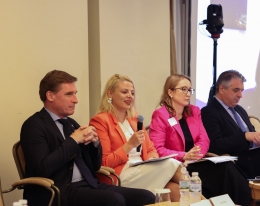European Economic
and Social Committee
Zemlje proširenja
EGSO aktivno sudjeluje u postupku proširenja EU-a, a za svoje odnose s organizacijama civilnog društva u zemljama proširenja razvio je dvojni pristup – regionalni i bilateralni.
Što se tiče regionalnog pristupa, Odbor za praćenje zapadnog Balkana – trajno unutarnje tijelo EGSO-a – glavni je instrument za koordinaciju aktivnosti EGSO-a u toj regiji. Forum civilnog društva zapadnog Balkana, koji se održava svake dvije godine, sastavni je dio tog Odbora za praćenje.
EGSO također radi na bilateralnoj razini sa zemljama zapadnog Balkana i Turskom. Na temelju sporazuma o pridruživanju između tih država i EU-a EGSO je osnovao tri zajednička tijela s predstavnicima civilnog društva Turske, Crne Gore i Srbije, kako bi organizacije civilnog društva uključio u pretpristupni i pristupni proces. Svako to tijelo sastoji se od jednakog broja članova iz EGSO-a i partnerske zemlje, a sastaje se dvaput godišnje.
EGSO održava redovite kontakte i organizira zajedničke aktivnosti s organizacijama civilnog društva u zemljama proširenja s kojima zajedničko tijelo predstavnika civilnog društva još nije uspostavljeno.
Rad zajedničkih tijela upotpunjen je izradom mišljenja EGSO-a o pretpristupnom i pristupnom procesu pojedinih zemalja, kao i o temama od regionalnog interesa.









